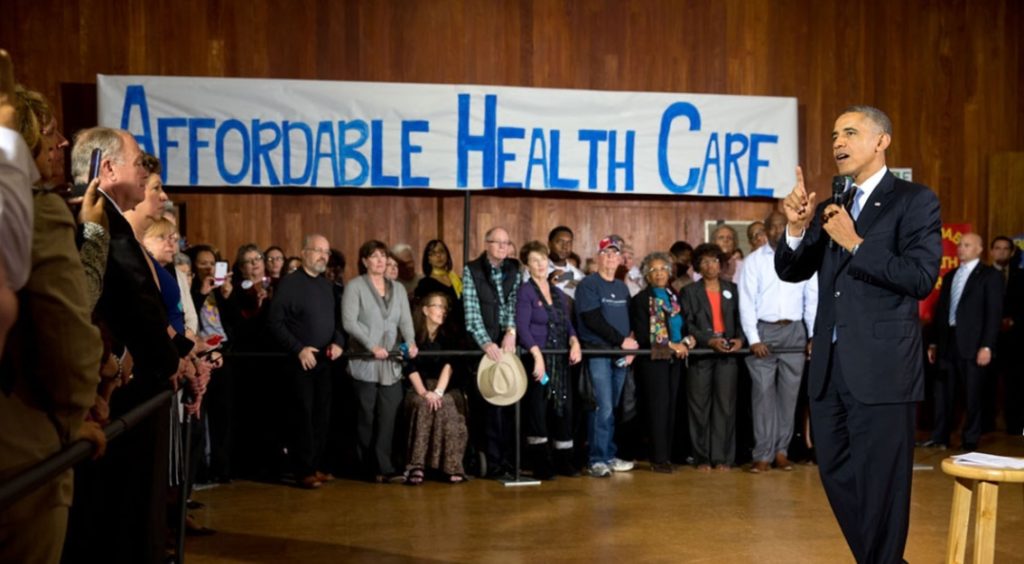by Dara S. Taylor. This article originally appeared on the Community Catalyst blog.

Photo Credit: White House Archives
Since the passage of the ACA over 20 million people have gained access to health insurance coverage through the Marketplace. A recent issue brief from the Commonwealth Fund reaffirms that substantially lowering uninsurance rates nationwide has also led to reductions in racial and ethnic disparities in health coverage. The health coverage gains have been most pronounced for minority groups and individuals with incomes below 139 percent of the federal poverty level.
Before the passage of the ACA, Latinx people had the highest initial uninsurance rate. Black people also had higher initial uninsurance rates than whites. Therefore, a reduction of the disparity gap was expected. What the report further details is the disparity-reducing effect of Medicaid expansion and non-expansion, whereas states that expanded Medicaid have had the strongest disparity-reducing effects.
As advocates, policy makers, providers and consumers, what we have to know and deeply understand is that health and health care disparities not only affect the groups facing disparities, they also limit the overall benefits (quality of care) that everyone stands to gain. As the nation grows more diverse, it is important to center our efforts on addressing health and health care disparities.
In order to fully eliminate racial and ethnic health disparities we must collectively work to dismantle systemically racist policies within and outside of the health care system. Providing insurance is an important first step in reducing disparity gaps. The Trump administration is consistently unveiling efforts to sabotage and undermine the gains that have been made by the ACA such as but not limited to: weakening federal rules that protect LGBTQ people, women and people with limited English proficiency; aiming to reduce eligibility for Medicaid and cut premium tax credits for millions by changing how the poverty level is adjusted each year; and increasing tax advantages for products that are often marketed to consumers as alternatives to health insurance but do not provide all the benefits they may need. We must continue to beat back these attacks and advocate on behalf of all consumers.
As we approach the seventh open enrollment period, November 1 – December 15, 2019, only two short months away, we must increase our efforts to educate and draw awareness to coverage options in the Marketplace as well as the yearlong opportunity to access Medicaid. These efforts will help to reach the remaining uninsured, many of whom are people of color. This outreach is especially important for immigrant populations who may be inaccurately misled to believe they cannot access the same benefits of other Americans due to the impending effectuation of the Public Charge rule. It is imperative that we help our fellow Americans know their rights so that everyone has access to coverage to meet their health care needs.
Additionally we must continue to fight for Medicaid expansion and defend and protect the ACA. Continue to reach out to your elected officials, and tell them why Medicaid expansion and the ACA are important to you, your family and your friends. As we continue to pursue all of our advocacy efforts lets hold Dr. Martin Luther King, Jr.’s words close to our hearts: “We are now faced with the fact that tomorrow is today. We are confronted with the fierce urgency of now. In this unfolding conundrum of life and history, there ‘is’ such a thing as being too late. This is no time for apathy or complacency. This is a time for vigorous and positive action.”
The opinions expressed in this article are those of the author and do not necessarily reflect those of the Diverse Elders Coalition.

